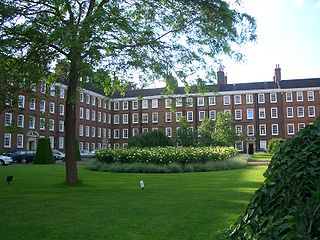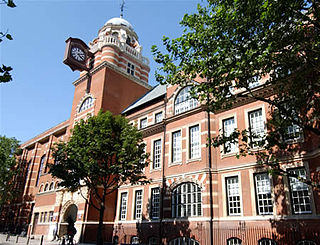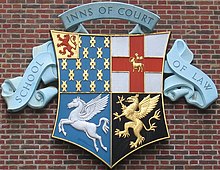
A barrister is a type of lawyer in common law jurisdictions. Barristers mostly specialise in courtroom advocacy and litigation. Their tasks include arguing cases in courts and tribunals, drafting legal pleadings, researching the law and giving legal opinions.

A Juris Doctor, Doctor of Jurisprudence, or Doctor of Law (JD) is a graduate-entry professional degree in law. The JD is the standard degree obtained to practice law in the United States, where there is no undergraduate professional law degree. Some jurisdictions, such as Australia, Canada and Hong Kong, offer both the JD and undergraduate qualifying law degrees.

The Honourable Society of Gray's Inn, commonly known as Gray's Inn, is one of the four Inns of Court in London. To be called to the bar in order to practise as a barrister in England and Wales, an individual must belong to one of these inns. Located at the intersection of High Holborn and Gray's Inn Road in Central London, the Inn is a professional body and provides office and some residential accommodation for barristers. It is ruled by a governing council called "Pension", made up of the Masters of the Bench and led by the Treasurer, who is elected to serve a one-year term. The Inn is known for its gardens, which have existed since at least 1597.

Legal education is the education of individuals in the principles, practices, and theory of law. It may be undertaken for several reasons, including to provide the knowledge and skills necessary for admission to legal practice in a particular jurisdiction, to provide a greater breadth of knowledge to those working in other professions such as politics or business, to provide current lawyers with advanced training or greater specialisation, or to update lawyers on recent developments in the law.

The Inns of Court in London are the professional associations for barristers in England and Wales. There are four Inns of Court: Gray's Inn, Lincoln's Inn, Inner Temple and Middle Temple.
A Bachelor of Laws is an undergraduate law degree offered in most common law countries as the primary law degree and serves as the first professional qualification for legal practitioners. This degree requires the study of core legal subjects and jurisprudence to provide a comprehensive understanding of the legal system and its function. The LLB curriculum is designed to impart a thorough knowledge of legal principles, legal research skills, and a sound understanding of the roles and responsibilities of lawyers within society. This degree is often a prerequisite for taking bar exams or qualifying as a practicing lawyer, depending on the jurisdiction. Additionally, the LLB program also serves as a foundation for further legal education, such as a Master of Laws (LLM) or other postgraduate studies in law.
A bar examination is an examination administered by the bar association of a jurisdiction that a lawyer must pass in order to be admitted to the bar of that jurisdiction.
The Postgraduate Certificate in Laws is an intensive one-year, full-time professional legal qualification programme in Hong Kong. It allows graduates to proceed to legal training in order to qualify to practice as either a barrister or a solicitor in Hong Kong. The "LL." of the abbreviation for the certificate is from the genitive plural legum. The programme is similar to the Legal Practice Course or the Bar Professional Training Course in England and Wales, or the Certificate in Legal Practice (Malaysia) in Malaysia which focuses heavily on practical and procedural issues in legal practice, unlike a first degree in law.

The Common Professional Examination/Postgraduate Diploma in Law (CPE/PGDL) is a postgraduate law course in England and Wales taken by non-law graduates wishing to become either a solicitor or barrister in England and Wales. It is being replaced by the Solicitors Qualifying Examination (SQE) which was introduced on 1 September 2021.

Barristers in England and Wales are one of the two main categories of lawyer in England and Wales, the other being solicitors. Barristers have traditionally had the role of handling cases for representation in court, both defence and prosecution.
The Graduate Diploma in Law/Postgraduate Diploma in Law/Common Professional Examination (GDL/PGDL/CPE) is a postgraduate law course in England and Wales that is taken by non-law graduates wishing to become either a solicitor or barrister in England and Wales. The course allows non-law students to convert to law after university ; it is commonly known as a "law conversion course". Regulated by the Solicitors Regulation Authority, the course is designed as an intense programme covering roughly the same content as a law degree LL.B (Hons) and the main goal is to allow people with a greater variety of educational backgrounds into the legal profession.
Nottingham Law School is a law school in the UK with over 100 full-time lecturers and over 2,500 students. It is an academic and professional institution, part of Nottingham Trent University.
Legal education in the United Kingdom is divided between the common law system of England and Wales and Northern Ireland, and that of Scotland, which uses a hybrid of common law and civil law.
BPP University Law School is a private, for-profit provider of professional and academic legal education in the United Kingdom and one of the founding schools of BPP University.
Legal education in Hong Kong generally refers to the education of lawyers before entry into practice.
BPP University is a private university in the United Kingdom.

The Bar Professional Training Course or BPTC is a postgraduate course which allows law graduates to be named and practise as barristers in England and Wales. The eight institutes that run the BPTC along with the four prestigious Inns of Court are often collectively referred to as Bar School. Until September 2010, it was known as the Bar Vocational Course, or BVC.
The Legal profession in England and Wales is divided into two distinct branches under the legal system, those of solicitors and barristers. Other legal professions in England and Wales include acting as a judge, as the Attorney-General, as the Solicitor-General, or as the Director of Public Prosecutions.
Westminster Law School (WLS) is the law school of the University of Westminster. Located at Little Titchfield Street near Regent Street in central London.
Legal education in England is the practice of teaching and learning English Law, whether to become a practicing lawyer or as an academic pursuit. Legal education has undergone significant changes over the last two thousand years, transforming from an exclusively apprenticeship-based process to one split across secondary education, the university, and the profession. Currently, university law degrees are regulated by the legal profession, which controls the core subjects a law degree must contain before graduates can pursue further professional qualification.










